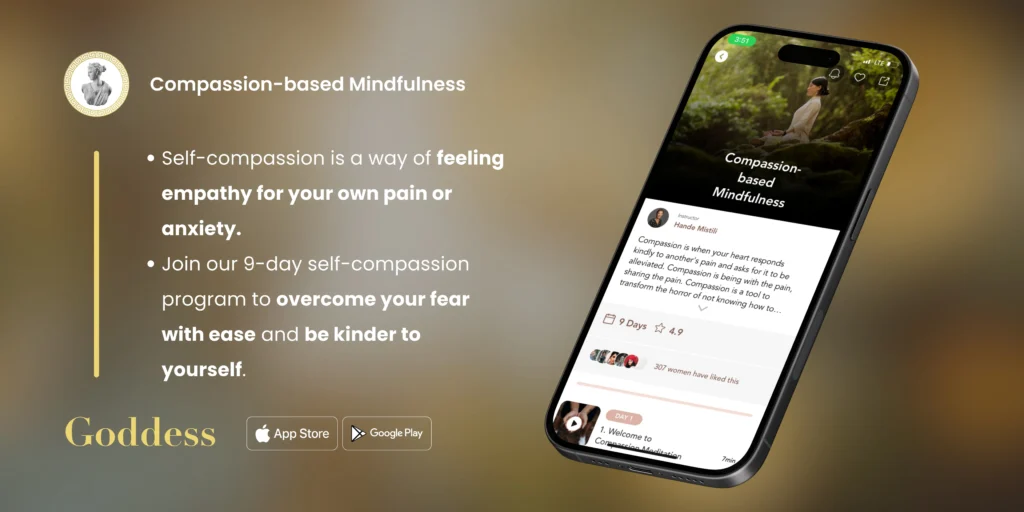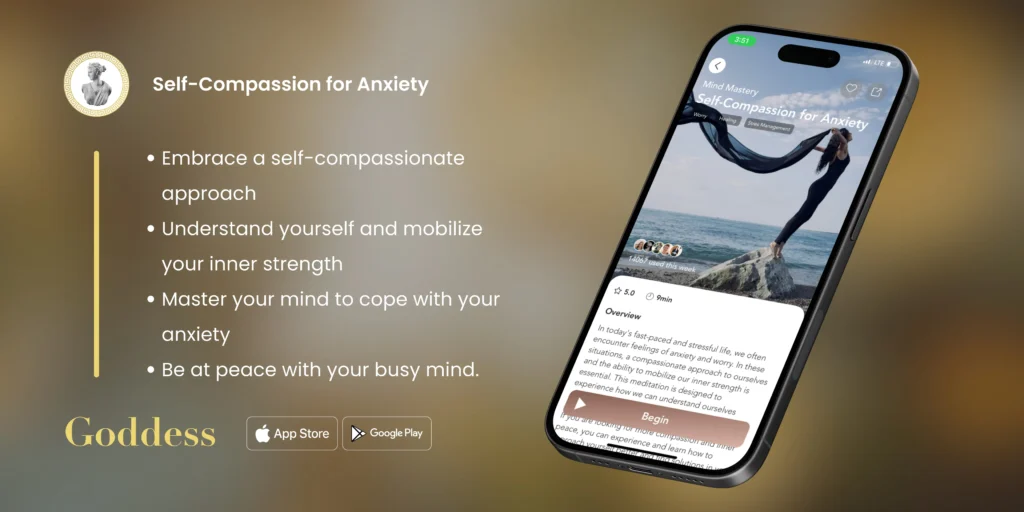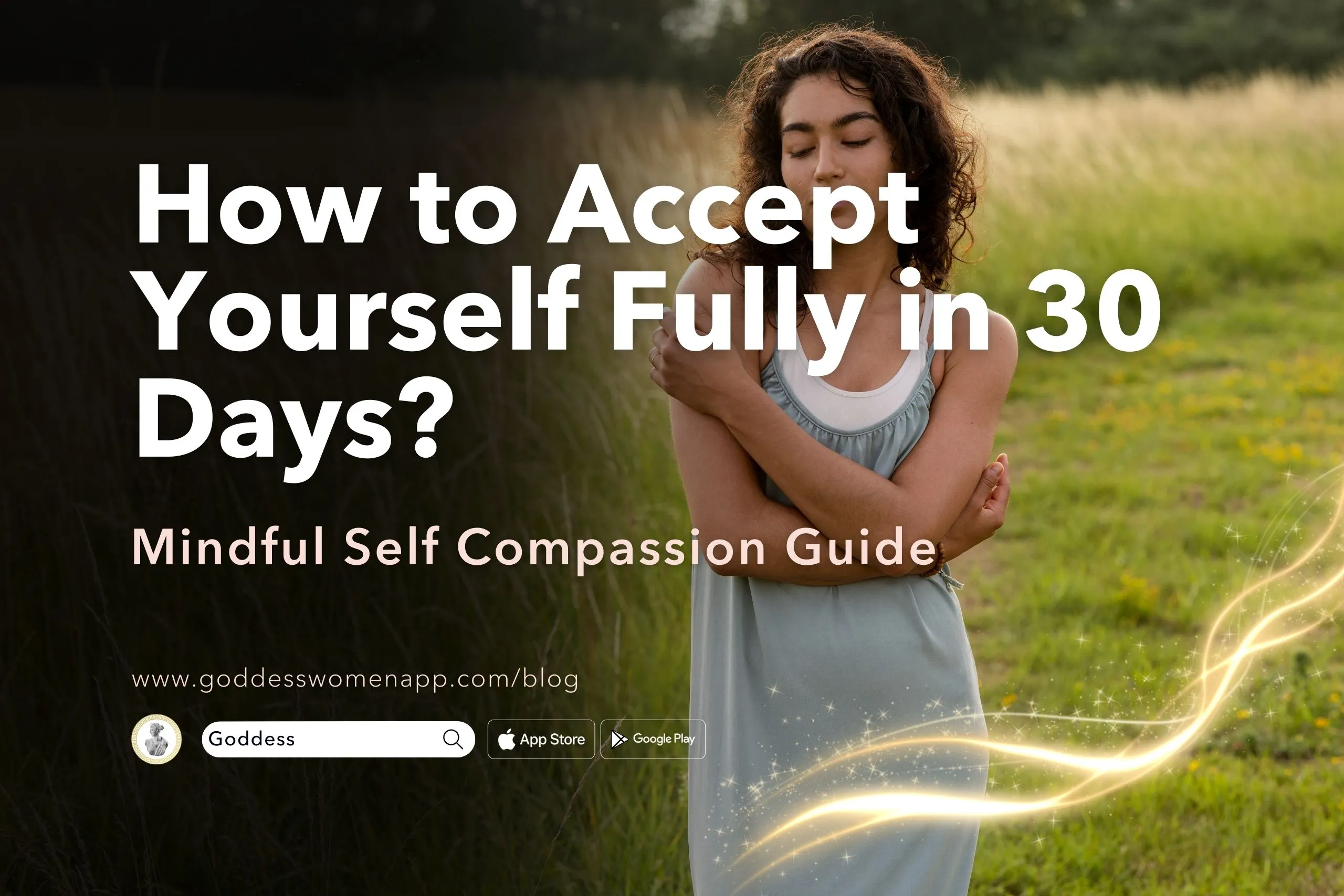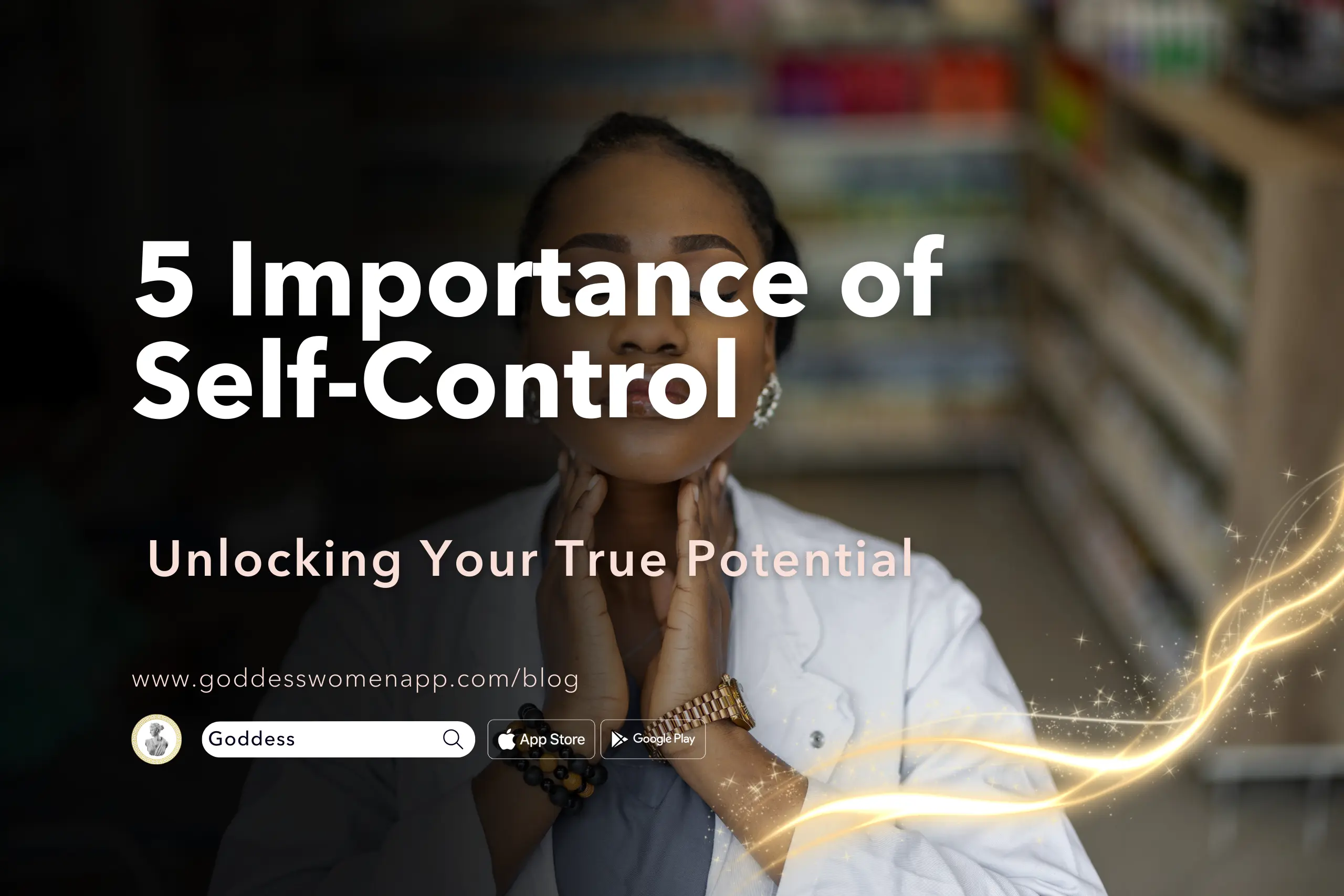Mindful self compassion is a powerful tool for improving emotional well being and overall life satisfaction. Rooted in the principles of mindfulness and self kindness, mindful self compassion involves treating oneself with the same compassion and understanding that one would offer a dear friend. It is an integral part of maintaining mental health and fostering emotional resilience.
In this 30-day journey, you will explore various self compassion practices designed to help you embrace yourself fully. Drawing on key components from the mindful self compassion workbook, MSC (mindful self-compassion) program and Dr. Nile Keskin’s book “New Feminine”, this guide will offer a step-by-step approach to developing self compassion skills. By the end of this program, you will have cultivated a greater understanding of self compassion and its impact on your psychological well being.
Easily show self-compassion to yourself with Goddess’ practical sessions. First, learn which Goddess archetype you embody to find the best fit exercises for your needs. Download Goddess now for your new gateway to a new self-compassionate you.

Week 1: Understanding Mindful Self Compassion
Day 1: Introduction to Mindful Self Compassion
Mindful self compassion is a practice that combines mindfulness with self kindness. It helps reduce self criticism and promotes a positive inner dialogue. Mindfulness practice involves paying attention to the present moment without judgment, which is crucial for developing self compassion skills. According to self compassion research, those who practice mindful self compassion experience less anxiety and depression and greater life satisfaction.
Day 2: Self-Reflection and Awareness
Understanding your inner critic is the first step in practicing self compassion. Self criticism can undermine emotional well being and hinder personal growth. Mindful awareness allows you to recognize destructive thoughts and replace them with a more compassionate inner dialogue. Use the self compassion scale to assess your current level of self kindness and identify areas for improvement.
Day 3: Practicing Mindfulness
Mindfulness-based stress reduction and mindfulness-based cognitive therapy are effective techniques for enhancing self compassion. These practices help you stay present and manage difficult emotions. By incorporating mindfulness skills into your daily life, you can develop a mindful path to greater self acceptance and reduced stress.
Day 4: Embracing Self Kindness
Self compassion involves treating yourself with the same kindness and care you would offer a friend. Practicing self kindness can significantly boost your emotional resilience and mental health. Incorporate affectionate breathing exercises from the MSC program to cultivate a sense of warmth and compassion towards yourself.

Day 5: Developing a Non-Judgmental Attitude
Recognizing and reducing self judgment is crucial for practicing self compassion. Mindfulness and self compassion work together to help you accept yourself as you are. This non-judgmental attitude fosters psychological well being and helps you navigate life’s challenges with greater ease.
Day 6: Building Emotional Resilience
Emotional resilience is the ability to bounce back from difficult emotions and life challenges. Self compassion practices, such as those found in the mindful self compassion workbook, enhance your ability to cope with stress and adversity. Developing a compassionate mindset towards yourself strengthens your inner resilience.
Day 7: Reflection and Journaling
Journaling is a powerful tool for self reflection and growth. Reflect on your experiences from the first week and identify any changes in your thought processes or emotional well being. Use journaling prompts to deepen your understanding of self compassion and plan your journey for the coming weeks.

Week 2: Deepening Your Practice
Day 8: Mindful Breathing Techniques
Mindful breathing is a foundational practice in mindful self compassion. It helps you stay grounded and present, reducing stress and promoting a sense of calm. Practice mindfulness breathing exercises daily to enhance your self compassion skills and improve your emotional well being.
Day 9: Loving-Kindness Meditation
Loving-kindness meditation is a practice that fosters compassion towards yourself and others. It involves sending positive wishes to yourself and extending them to others. This meditation strengthens your capacity for self compassion and builds a sense of common humanity.
Day 10: Self-Compassionate Letter Writing
Writing a self-compassionate letter to yourself is a powerful exercise for fostering self kindness. This practice helps you address negative emotions and transform your inner dialogue. Reflect on your challenges and offer yourself words of comfort and encouragement.
Day 11: Positive Affirmations for Self Compassion
Positive affirmations are statements that reinforce self kindness and compassion. Incorporate daily affirmations into your mindfulness practice to boost your self esteem and cultivate a compassionate mindset. These affirmations can help counteract self criticism and promote emotional resilience.

Day 12: Understanding and Managing Stress
Mindful self compassion is a valuable tool for managing stress. Techniques such as mindfulness-based stress reduction and mindfulness-based cognitive therapy can help you navigate stressful situations with greater ease. These practices enhance your ability to remain calm and composed during difficult times.
Day 13: Cultivating Gratitude
Gratitude practices are essential for fostering a positive outlook and enhancing your self compassion practice. By regularly reflecting on what you are grateful for, you can shift your focus from negative thoughts to positive outcomes. This practice boosts happiness and overall life satisfaction.
Day 14: Reflection and Journaling
At the end of the second week, take time to reflect on your progress. Use journaling prompts to explore how your self compassion practice has evolved and identify areas for further growth. Journaling helps consolidate your learning and provides insights into your emotional well being.

Week 3: Overcoming Challenges
Day 15: Identifying Barriers to Self Compassion
Recognizing the barriers to self compassion is crucial for overcoming them. Common barriers include self judgment, fear of self indulgence, and difficulty acknowledging difficult emotions. Understanding these obstacles allows you to develop strategies to navigate them effectively.
Day 16: Dealing with Negative Emotions
Mindful self compassion provides tools for managing negative emotions. Techniques such as affectionate breathing and loving-kindness meditation help you approach difficult emotions with compassion and understanding. These practices reduce the impact of negative thoughts and promote emotional resilience.
Day 17: Self-Compassion in Difficult Situations
Applying self compassion during challenging times can transform your experience. When difficulties arise, remind yourself of the principles of self compassion and practice mindfulness to stay grounded. This approach helps you navigate tough situations with greater ease and self acceptance.
Day 18: The Role of Forgiveness
Forgiveness is a key component of self compassion. It involves letting go of self judgment and embracing self acceptance. By practicing forgiveness, you can release negative emotions and foster a more compassionate relationship with yourself.
Day 19: Setting Boundaries with Compassion
Setting healthy boundaries is essential for maintaining emotional well being. Self compassionate boundary setting involves understanding your needs and communicating them effectively. This practice helps protect your mental health and promotes positive personal relationships.

Day 20: Compassionate Communication
Compassionate communication is a mindfulness skill that enhances your interactions with others. By practicing non-violent communication, you can express yourself clearly and empathetically. This approach fosters healthier relationships and reduces conflict.
Day 21: Reflection and Journaling
As you conclude the third week, reflect on the challenges you have faced and the progress you have made. Use journaling prompts to explore your experiences and identify strategies for continued growth. This practice reinforces your commitment to mindful self compassion and prepares you for the final week of the program.
Embracing mindful self compassion is a journey that enhances your emotional resilience, psychological well being, and overall life satisfaction. By following this 30-day program, you will cultivate a compassionate relationship with yourself and transform your daily life.
Week 4: Integrating Self Compassion into Your Life
Day 22: Creating a Self-Compassionate Routine
Integrating self compassion into your daily life involves creating a routine that supports your emotional well being. Drawing from the mindful self compassion workbook, establish practices such as affectionate breathing, mindful awareness, and self-kindness exercises. These mindfulness skills, when practiced consistently, enhance your mental health and overall life satisfaction.
Day 23: Enhancing Relationships with Self Compassion
Practicing self compassion not only benefits you but also improves your personal relationships. Self compassion involves recognizing our common humanity and fostering a compassionate friend approach towards others. By being self compassionate, you can transform difficult relationships and navigate negative emotions with greater understanding and empathy.

Day 24: Self Compassion and Physical Health
Mindful self compassion positively impacts physical health by reducing stress and promoting emotional resilience. Mindfulness-based stress reduction techniques, along with self compassion practices, can alleviate chronic pain and enhance your physical well being. Incorporate mindfulness practice into your daily life to support both your mental and physical health.
Day 25: Mindful Self Compassion in the Workplace
Applying self compassion in professional settings can lead to positive outcomes, such as reduced stress and improved emotional intelligence. Use mindfulness-based cognitive therapy to handle workplace challenges and practice self kindness to boost your self esteem. By fostering a self compassionate work environment, you contribute to your overall psychological well being.
Day 26: Long-Term Goals and Vision
Setting long-term goals with a self compassionate mindset involves recognizing your innate compassion and practicing self acceptance. Reflect on your achievements and envision a future where mindful self compassion is integral to your daily life. Use the MSC program principles to guide your goal-setting process and ensure it aligns with your emotional well being.
Day 27: Embracing Imperfection
Embracing imperfection is a key component of self compassion. Understand that feeling inadequate is a part of being human. Use techniques from the mindful self compassion workbook to practice self kindness and reduce self judgment. This approach fosters greater self acceptance and strengthens your emotional resilience.

Day 28: Sustaining Your Practice
Sustaining your self compassion practice involves ongoing mindfulness training and self regulation. Engage with the MSC program and explore self compassion research to stay motivated. Regularly assess your progress using the self compassion scale and continue to refine your self compassion skills for long-term psychological well being.
Day 29: Reflection and Celebration
Reflecting on your 30-day journey allows you to celebrate your progress and recognize the positive changes in your emotional well being. Use journaling prompts to document your experiences and express gratitude for the growth you have achieved. Celebrate your commitment to practicing mindful self compassion and the improvements in your mental health and life satisfaction.
Day 30: Moving Forward with Mindful Self Compassion
As you conclude this 30-day program, carry forward the practices you have learned. Continue to integrate self compassion into your daily life and embrace the mindful path to emotional resilience and well being. Remember, self compassion involves a lifelong commitment to self kindness and understanding.
Download Goddess for all-in-one wellness coach specifically designed for women and their needs. From meditations, yoga sessions and breathworks allow you to boost your self-compassion and understanding to yourself. You need only yourself. Why not relying on yourself from now on?

Conclusion
The journey of practicing mindful self compassion is transformative and empowering. By following this 30-day program, you have developed essential self compassion skills that enhance your emotional well being and psychological well being. Through self kindness, mindful awareness, and embracing our common humanity, you have cultivated a deeper understanding of yourself.
Mindful self compassion is not just a practice but a way of life. It involves continuous self reflection, mindfulness practice, and self acceptance. By integrating these principles into your daily life, you can navigate life challenges with greater ease and resilience. The self compassion practices you have learned are tools for lifelong emotional growth and well being.
What’s Next?
Join a community of like-minded individuals committed to practicing mindful self compassion. Engage with resources such as the Greater Good Science Center and Harvard Medical School to deepen your understanding. Share your journey and inspire others to embrace self compassion.
Continue to practice mindfulness and self kindness daily. Explore further with the mindful self compassion workbook and seek support from certified MSC teachers and clinical psychologists. Embrace the mindful path and commit to ongoing self compassion practice for a happier, healthier life.
Practice self compassion with Goddess, mindful self compassion program unleashes you fierce self compassion and self esteem. As a human being, feel inadequate, chronic pain can lead to inner strength if these will be worked on properly.

Read more:

